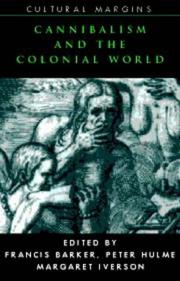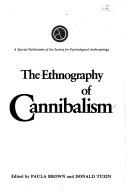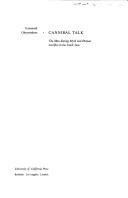| Listing 1 - 10 of 23 | << page >> |
Sort by
|
Book
ISBN: 0195025067 Year: 1979 Publisher: New York : Oxford University Press,
Abstract | Keywords | Export | Availability | Bookmark
 Loading...
Loading...Choose an application
- Reference Manager
- EndNote
- RefWorks (Direct export to RefWorks)
Cannibalism --- Cannibalisme --- Anthropophagy --- Ethnology --- Cannibalism.
Book
ISBN: 3892955824 Year: 1996 Publisher: Tübingen Diskord
Abstract | Keywords | Export | Availability | Bookmark
 Loading...
Loading...Choose an application
- Reference Manager
- EndNote
- RefWorks (Direct export to RefWorks)
Cannibalism --- Cannibalisme --- Congresses. --- Congrès --- Congrès

ISBN: 9783793092582 3793092585 Year: 2001 Publisher: Freiburg im Breisgau : Rombach,
Abstract | Keywords | Export | Availability | Bookmark
 Loading...
Loading...Choose an application
- Reference Manager
- EndNote
- RefWorks (Direct export to RefWorks)

ISBN: 052162908X 0521621186 Year: 1998 Publisher: Cambridge Cambridge University Press
Abstract | Keywords | Export | Availability | Bookmark
 Loading...
Loading...Choose an application
- Reference Manager
- EndNote
- RefWorks (Direct export to RefWorks)
Thematology --- Ethnology. Cultural anthropology --- Iconography --- Cannibalism. --- Cannibalism in literature. --- Cannibalisme --- Cannibalisme dans la littérature --- Cannibalism in literature.. --- Cannibalisme dans la littérature

ISBN: 0913077003 Year: 1983 Publisher: Washington (D.C.) Society for psychological anthropology
Abstract | Keywords | Export | Availability | Bookmark
 Loading...
Loading...Choose an application
- Reference Manager
- EndNote
- RefWorks (Direct export to RefWorks)
Cannibalism --- Cannibalisme --- Congresses --- Congrès --- Congresses. --- Congrès --- Anthropophagy --- Ethnology
Book
ISBN: 286906828X 2869063687 Year: 2022 Publisher: Tours Presses universitaires François-Rabelais
Abstract | Keywords | Export | Availability | Bookmark
 Loading...
Loading...Choose an application
- Reference Manager
- EndNote
- RefWorks (Direct export to RefWorks)
Lorsqu'au xvie siècle les mangeurs d'hommes - les anthropophages - reçoivent le nom de cannibales, c'est aussi une tradition millénaire qui adopte des formes nouvelles. Avant Colomb, il y a en effet une histoire occidentale de l'homme comme nourriture, mais celle-ci reste en grande partie à écrire. Le présent ouvrage contribue à combler cette lacune. Dans les récits et les images de l'ethnographie ancienne, l'anthropophage, qu'il mange ses ennemis ou ses défunts bien-aimés, est un être lointain, dont les coutumes bousculent les normes culturelles occidentales. Menace distante, alors, le cannibale ? Bien au contraire : on dit de groupes et d'individus marginaux qu'ils convoitent la chair d'enfants innocents pour leurs mystérieux rituels. On parle aussi d'affamés qui n'hésitent pas à dévorer leurs proches, de femmes désespérées qui mangent leurs enfants. Pendant ce temps, pourtant, du sang humain soigne, stimule, rassasie ou sanctifie, tandis que de pieux chrétiens consomment la chair du Christ sous les apparences de l'hostie. À l'aide des méthodes de l'histoire et des disciplines sœurs, l'auteur reconstitue un portrait tout en contrastes du tabou alimentaire par excellence. Entre imaginaires plus ou moins informés et réalités plus ou moins déformées, un parcours varié et étonnant se dessine.
Anthropology --- anthropologie --- histoire --- anthropophagie --- cannibalisme --- Moyen Âge --- Moyen Âge
Book
ISBN: 9781782276203 Year: 2020 Publisher: London : Pushkin Press,
Abstract | Keywords | Export | Availability | Bookmark
 Loading...
Loading...Choose an application
- Reference Manager
- EndNote
- RefWorks (Direct export to RefWorks)
"It all happened so quickly. First, animals became infected with the virus and their meat became poisonous. Then, governments initiated the Transition. Now, 'special meat' - human meat - is legal. Marcos is in the business of slaughtering humans only no one calls them that. He works with numbers, consignments, processing. One day, he's given a gift to seal a deal: a specimen of the finest quality. He leaves her in his barn, tied up, a problem to be disposed of later. But the specimen haunts Marcos. Her trembling body, her eyes that watch him, that seem to understand. And soon, he becomes tortured by what has been lost - and what might still be saved."--Publisher
Cannibalism --- Cannibalism. --- Cannibalisme --- Executions and executioners --- Psychological aspects
Book
ISSN: 02941945 ISBN: 9057090031 9789057090035 Year: 1998 Publisher: Amsterdam : Editions des archives contemporaines,
Abstract | Keywords | Export | Availability | Bookmark
 Loading...
Loading...Choose an application
- Reference Manager
- EndNote
- RefWorks (Direct export to RefWorks)
Human body --- Spirit possession --- Cannibalism --- Corps humain --- Possession par les esprits --- Cannibalisme --- Sociologie du corps --- Esprit et corps --- Anthropologie

ISBN: 0520243072 0520243080 1417585110 1597345229 1282763156 9786612763151 0520938313 9780520938311 9780520243071 9780520243088 9781417585113 Year: 2005 Publisher: Berkeley
Abstract | Keywords | Export | Availability | Bookmark
 Loading...
Loading...Choose an application
- Reference Manager
- EndNote
- RefWorks (Direct export to RefWorks)
In this radical reexamination of the notion of cannibalism, Gananath Obeyesekere offers a fascinating and convincing argument that cannibalism is mostly "cannibal talk," a discourse on the Other engaged in by both indigenous peoples and colonial intruders that results in sometimes funny and sometimes deadly cultural misunderstandings. Turning his keen intelligence to Polynesian societies in the early periods of European contact and colonization, Obeyesekere deconstructs Western eyewitness accounts, carefully examining their origins and treating them as a species of fiction writing and seamen's yarns. Cannibalism is less a social or cultural fact than a mythic representation of European writing that reflects much more the realities of European societies and their fascination with the practice of cannibalism, he argues. And while very limited forms of cannibalism might have occurred in Polynesian societies, they were largely in connection with human sacrifice and carried out by a select community in well-defined sacramental rituals. Cannibal Talk considers how the colonial intrusion produced a complex self-fulfilling prophecy whereby the fantasy of cannibalism became a reality as natives on occasion began to eat both Europeans and their own enemies in acts of "conspicuous anthropophagy."
Cannibalism. --- Cannibalisme --- Cannibalism --- Anthropology --- Social Sciences --- Social & Cultural Anthropology --- Ethnology. --- Cultural anthropology --- Ethnography --- Races of man --- Social anthropology --- Anthropophagy --- Ethnology --- Human beings

ISBN: 0791450902 0791450899 9780791450901 9780791450895 0791490017 9780791490013 Year: 2001 Publisher: Albany State university of New York press
Abstract | Keywords | Export | Availability | Bookmark
 Loading...
Loading...Choose an application
- Reference Manager
- EndNote
- RefWorks (Direct export to RefWorks)
Linking cannibalism to issues of difference crucial to contemporary literary criticism and theory, the essays included here cover material from a variety of contexts and historical periods and approach their subjects from a range of critical perspectives. Along with such canonical works as The Odyssey, The Faerie Queene, and Robinson Crusoe, the contributors also discuss lesser known works, including a version of the Victorian melodrama Sweeny Todd, as well as contemporary postcolonial and postmodern novels by Margaret Atwood and Ian Wedde. Taken together, these essays re-theorize the relationship between cannibalism and cultural identity, making cannibalism meaningful within new critical and cultural horizons.Contributors include Mark Buchan, Santiago Colas, Marlene Goldman, Brian Greenspan, Kristen Guest, Minaz Jooma, Robert Viking O'Brien, Geoffrey Sanborn, and Julia M. Wright.
| Listing 1 - 10 of 23 | << page >> |
Sort by
|

 Search
Search Feedback
Feedback About UniCat
About UniCat  Help
Help News
News